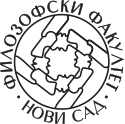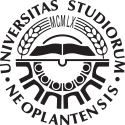| Contents of lectures |
Conceptual-terminological determination of basic ethical categories and principles. General theory of action. The notion of moral action. Practical philosophy and ethics. Basic ethical questions (the source of morality, the problem of the way of establishing a moral character, the working forms of morality, the question of the purpose of morality). Freedom as a source of morality. The concept of moral character (moral motives, moral beliefs, moral intent, decision and source, moral imputation, guilt and sanction, moral responsibility, moral shame and repentance, moral merit, concept of conscience). Working forms of morality. The purpose of moral action (the moral principle of good, the ethical principle of evil, the principle of bliss, the principle of satisfaction, the principle of usefulness). Applied ethics (ethics of the theory and practice of human rights, the notion of applied or professional ethics or deontology, concepts of bioethics, ethics of technology, ethics of science, ecological ethics, political ethics, ethics of law, ethics of culture, business ethics). Ethics of communication, information and media (conceptual similarities and demarcations, concept of ethics of information, concept of media ethics, basic problems of media ethics: publicity and privacy, truthfulness and suggestion, freedom of expression and censorship problem, the notion of critical public, controlling authorities against monopolization, advice for the media). |

